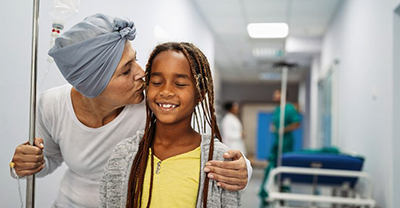Hospice and palliative care benefit thousands of people at the end of their lives, but Black people continue to utilize it at lower rates than their white counterparts.
By Ottamissiah “Missy” Moore
I’ve been a nurse for 33 years and have spent 25 of those years caring for people in hospice. In 2017, my son, Demitrice was diagnosed with an aggressive form of cancer, and suddenly hospice came home. I knew we didn’t have a lot of time left together, and I wanted to spend every moment with my son. That’s why hospice was the right choice for Demitrice and our family.
On National Healthcare Decisions Day, I want to share the importance of compassionate death in the Black community, including hospice care. Hospice is a set of services designed to treat symptoms and side effects, improve quality of life, support families and address spiritual needs. It occurs during the last 6 months of life, after treatment of the life-limiting disease has stopped.
In the days after we chose hospice, a doctor, nurses, a social worker, and a chaplain visited our home and lent us the care and support that Demitrice needed to avoid suffering while being surrounded by loved ones. Because of hospice, I was able to focus on my son in his last days.
Those days were filled with watching movies and eating homemade chocolate chip cookies. Hospice meant that Demitrice could truly live until he died, and that every moment was spent with his loved ones. He also avoided the suffering associated with cancer because hospice reduced his symptoms and kept him comfortable.
There is evidence that Demitrice’s experience isn’t unique. Hospice and palliative care benefit thousands of people at the end of their lives, but Black people continue to utilize it at lower rates than their White counterparts. A recent Journal of the American Medical Association (JAMA) study found that 34.9% of Black study participants died using hospice services compared with 46.2% of White participants. This disparity echoes the disparities that occur throughout the lives of Black people, from being less likely to receive pain medications, to dying at higher rates in childbirth.
The causes of this disparity in hospice use are varied — from racism and unconscious bias to a lack of trust in the medical system. Black people are also less likely to fill out an advance directive, which speaks for a person when they can’t speak for themselves. The hospice workers helped us put Demitrice’s affairs in order and fill out an advance directive, including a chaplain who shared his spiritual wisdom.
But you don’t have to wait until you get sick to share your wishes for the end of life with your loved ones. National Healthcare Decisions Day is a time for families to discuss and consider their end-of-life options in the event that someone gets sick. The national nonprofit Compassion & Choices offers free tools and resources on planning for the end of life for individuals and their families, including an End-of-Life Decision Guide and Toolkit that walks you through the steps of identifying your wishes and conveying them to others.
I hope that Demitrice’s story helps others make decisions about their end-of-life care. He died surrounded by myself and my son, peacefully and at home.
Ottamissiah “Missy” Moore is a nurse, consultant & community activist based in Washington, DC.

